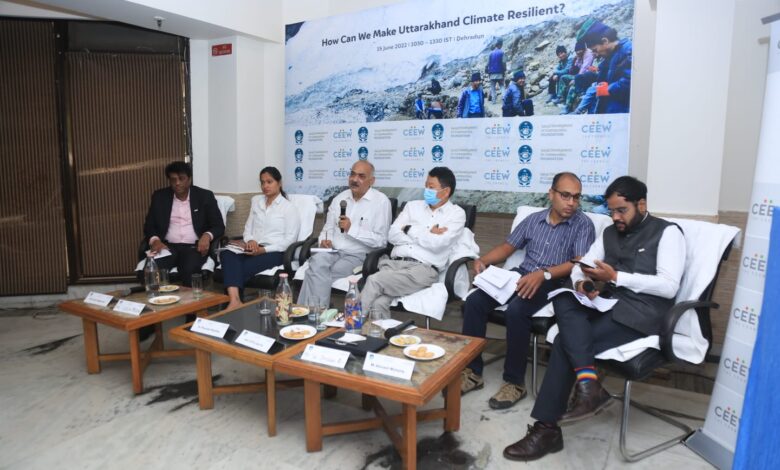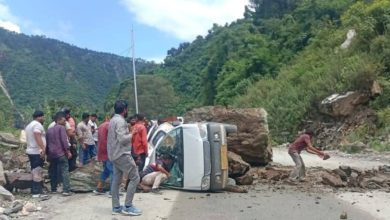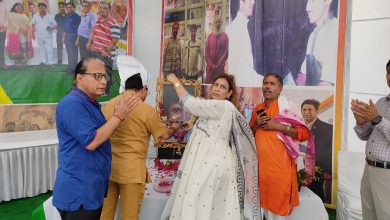Uttrakhand to prioritise citizen friendly climate actions and early warning systems

Dehradun, 15 June 2022:

The mayor of Dehradun Sunil Uniyal Gama, on Wednesday said, “This workshop is very timely and shows us the need to integrate national, sub-national and city level disaster preparedness by CEEW-USDMA and SDC foundation”. He also stressed upon the increased occurences of forest fires as a point of great concern for Uttarkhand and highlighted climate disasters such as floods and droughts as major barriers to the state’s developmental agenda.Mayor Sunil Gama also congratulated the organisers for bringing all the relevant stakeholders together.”

Dehradun Mayor Sunil Uniyal Gama expressed these views while delivering his keynote address at a multi-stakeholder panel discussion titled ‘How Can We Make Uttarakhand Climate Resilient? organised by the Uttarakhand State Disaster Management Authority in collaboration with the Council on Energy, Environment and Water (CEEW) and Social Development for Communities (SDC) Foundation on 15 June 2022. Mr. Mrutyunjay Mohapatra, Director General, Indian Meteorological Department (IMD), and Dr Piyush Rautela, Executive Director, Disaster Mitigation and Management Centre (DMMC) and Uttarakhand State Disaster Management Authority (USDMA), also attended the panel discussion.
The discussion focused on ways to protect vulnerable communities and investments in infrastructure, housing, transport, and industries from climate-related disasters with the help of CEEW’s Climate Risk Atlas, a dynamic risk assessment and decision support toolkit.
According to Climate Vulnerability Index (CVI), released by CEEW in 2021, Uttarakhand is highly vulnerable to extreme climate events such as floods, and in the last decade damage from such extreme climate events have increased significantly. The CRA will identify, assess and predict chronic and acute risks related to extreme weather events such as heat and water stress, crop loss, vector-borne diseases and biodiversity collapse at the national, state, and district levels to a 25-km granularity.
Director General, Indian Meteorological Department (IMD) Mritunjaya Mahapatra said, “IMD is committed to make climate – related information citizen friendly and we are taking steps to devise impact – based alert systems. Uttarakhand is a climate – vulnerable state and IMD making all efforts provide granular weather informations and alerts.
Communities in the hills are experiencing harsh impacts of changing climate such as upward – moving snow lines, receding glaciers, erratic rainfall, reduction of snow in winters. Such change in weather patterns are making them more fragile.”
Dr Piyoosh Rautela, Executive Director, Disaster Mitigation and Management Centre (DMMC), Uttarakhand State Disaster Management Authority (USDMA) said, “Reinforcement of the existing structures and innovative architectural measures in terms of by-laws, material innovation and structural innovations to withstand the disasters. Early warning systems have to be further strengthend and this can help save lives, livelihoods and avert loss and damage across sectors. Urban Local Bodies and Panchayats should also have robust alert mechanisms and should remain prepared to deal with climate disasters round the year.”
Mr Abinash Mohanty, Programme Lead, CEEW, said “Studies conducted by the Ministry of Earth Sciences last year showed that the Hindu Kush Himalayas experienced a temperature rise of about 1.3°C during 1951–2014. The increase in temperature has led to micro climatic changes and faster glacial retreat in Uttarakhand, thereby triggering frequent and recurrent flash floods. CEEW’s analysis finds that over 85 per cent of districts in Uttarakhand, home to over 9 million people, are hotspots of extreme floods and their associated events. This workshop is an attempt to bring central agencies like National Disaster Management Authority (NDMA), IMD and state agencies like Uttarakhand Disaster Management Authority and city-level agencies to converge and collaboratively mainstream implementable climate action plans in the state.”
Mr Anoop Nautiyal, Founder, SDC Foundation said, “ “I express my sincere gratitude to Uttrakhand Disaster Management Authority, CEEW, and all the line departments for the insights, which will surely contribute to building resilience in Uttarakhand.”
Other dignitaries at the event were Shri STS Lepcha, IFS (Retd.) and Senior Advisor, SDC Foundation; Ms Rachele Gianfranchi, Head of Government Affairs, Everbridge; Mr Sumit Aggarwal, Director, Sales Public Safety, Asia Pacific, Everbridge; Dr Ruchi Badola, Scientist – G & Registrar, Wildlife Institute of India.
Kindly recall that the Council on Energy, Environment and Water (CEEW) is one of Asia’s leading non profit policy research institutions. The Council uses data, integrated analysis, and strategic outreach to explain – and change – the use, reuse, and misuse of resources. It prides itself on the independence of its high-quality research, develops partnerships with public and private institutions, and engages with wider public. In 2021, CEEW once again featured extensively across ten categories in the 2020 Global Go To Think Tank Index Report. The Council has also been consistently ranked among the world’s top climate change think tanks. Follow us on Twitter @CEEWIndia for the latest updates.





